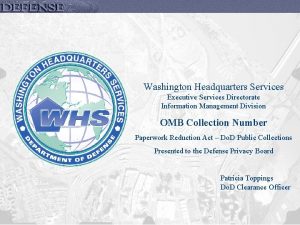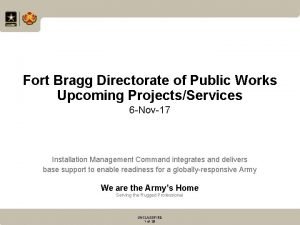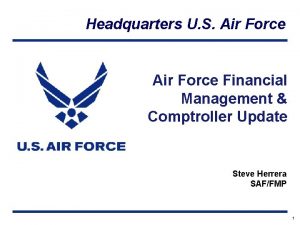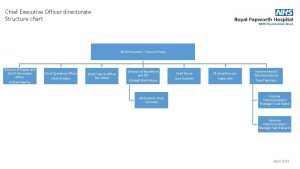Washington Headquarters Services Executive Services Directorate Information Management







- Slides: 7

Washington Headquarters Services Executive Services Directorate Information Management Division OMB Collection Number Paperwork Reduction Act – Do. D Public Collections Presented to the Defense Privacy Board Patricia Toppings Do. D Clearance Officer

Paperwork Reduction Act (PRA) Public Information Requirements • The purpose of the PRA is to minimize paperwork burden on members of the public resulting from the collection of information by or for the Federal Government • Federal agencies shall not collect information from the public without first obtaining OMB approval, and should not seek to enforce or request compliance with disapproved or expired public information collections • OMB approval is for a maximum of three years Authority • Chapter 35 of Title 44 U. S. C. and its implementing regulation 5 CFR 1320 cover the policy for collecting information from the public • Do. D Instruction 8910. 1 provides Do. D policy and procedure for collecting information from the public • Chapter 3 of Do. D 8910. 1 -M provides the details of the submission process Background • Do. D CIO is Senior Official responsible for the PRA • WHS/ESD Information Management Division implements PRA within Do. D for the Do. D CIO • Do. D Clearance Officer resides in the WHS/ESD Information Management Division 2

Paperwork Reduction Act (PRA) – Public Information Requirements Information Collection Budget (ICB) • ICB required by the Act (annual requirement) • OMB provides ICB to Congress • WHS/ESD Information Management Division submits annual ICB to OMB via the Do. D CIO • ICB report includes status of PRA violations • Violations are due to failure to review active collections before their expiration dates, or to collecting information without OMB approval • Do. D is taking active steps to achieve zero PRA violations 3

Paperwork Reduction Act (PRA) – Public Information Collections Process Requirements • Two notices required to be published in Federal Register prior to OMB review: 60 -day notice, published by sponsoring agency, seeking public comment on proposed collection Submit via Component IMCO to osd. federal. register@whs. mil 30 -day notice, published by WHS/ESD/IMD, announcing to public that the proposed collection has been sent to OMB and affording the public a second chance to comment • Comments on 60 -day notice go to the sponsoring agency • Comments on 30 -day notice go directly to the OMB Desk Officer • OMB Desk Officer has a 30 -day review period after the end of the comment period for the 30 -day notice • Do. D has three OMB Desk Officers: One assigned to collections for the Army Corps of Engineers, one assigned to collections for OASD(Health Affairs), one assigned to collections for the DARS (DFARS collections) as well as all other Do. D collections. • Entire process takes approximately 150 days (120 days mandated by the PRA and 5 CFR 1320) • Agencies need to plan ahead 4

Paperwork Reduction Act (PRA) – Public Information Collections Public Information Collection Package • OMB 83 -I form • Supporting Statement consisting of 19 elements that require answers (5 additional elements for surveys) • Relevant portions of applicable laws and regulations that authorize the information collection • Instrument of collection (form, survey, database screen shots etc. ) • Instructions or guidelines that accompany the instrument of collection Do. D Clearance Officer will add the following documents to the package: • Copy of 60 -day Federal Register Notice • Copy of 30 -day Federal Register Notice 5

Paperwork Reduction Act (PRA) – Public Information Collections Emergency Public Information Collections • Do. D CIO must approve and make request to OMB to authorize emergency processing • Requires written determination that agency cannot reasonably comply with normal processing because: Public harm is likely to result if normal clearance procedures are followed An unanticipated event has occurred (natural disaster) Normal clearance procedures is likely to prevent or disrupt collection of information, or cause a statutory or court-ordered deadline to be missed • Sensitive political issues may necessitate emergency processing • Insufficient planning or administrative oversight do not warrant emergency processing • Federal Register notice may or may not be required • If Federal Register notice is required, the public is afforded a short comment period of two weeks • Approval of an emergency package is good for 180 days • A regular submission package must follow, and all normal process procedures observed 6

Paperwork Reduction Act (PRA) – Public Information Collections Major Functions of the Do. D Information Management Program • Ensure that sufficient information is available to accomplish agency missions, to improve agency performance, and to achieve military effectiveness and management efficiency. • Minimize and control the burden associated with the collection and reporting of information. • Ensure that information requirements are valid, accurate, and essential to the mission of the requiring Do. D Component. • Avoid both duplication and unnecessary generation of data. • Subject each new or revised information requirement to a cost estimate. • Standardize data used to support Do. D operations and decision-making. • Ensure that recurring information requirements are assessed for validity, necessity, and adequacy no less than every three years. 7













